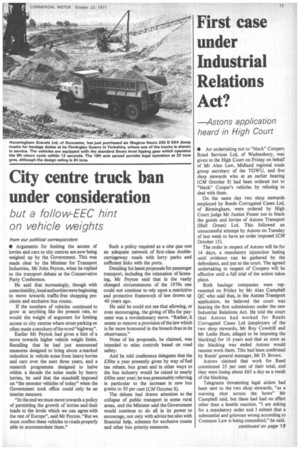City centre truck ban under consideration
Page 19

If you've noticed an error in this article please click here to report it so we can fix it.
but a follow-EEC hint on vehicle weights
from our political correspondent
• Arguments for limiting the access of lorries and cars to city centres are now being weighed up by the Government. This was made clear by the Minister for Transport Industries, Mr John Peyton, when he replied to the transport debate at the Conservative Party Conference.
He said that increasingly, though with some timidity, local authorities were beginning to move towards traffic-free shopping precincts and exclusive bus routes.
If the numbers of vehicles continued to grow at anything like the present rate, so would the weight of argument for limiting access to city centres where street parking os often made a mockery of the word "highway".
Earlier Mr Peyton had given a hint of a move towards higher vehicle weight limits. Recalling that he had just announced measures designed to bring about a marked reduction in vehicle noise from heavy lorries and cars over the next three years, and a research programme designed to halve within a decade the noise made by heavy lorries, he said that the standstill imposed on "the monster vehicles of today" when the Government took office could only be an interim measure.
"In the end we must move towards a policy of permitting the growth of lorries and their loads to the levels which we can agree with the rest of Europe", said Mr Peyton. "But we must confine these vehicles to roads properly able to accommodate them."
Such a policy required as a sine qua non an adequate network of first-class doublecarriageway roads with lorry parks and sufficient links with the ports.
Detailing his latest proposals for passenger transport, including the relaxation of licensing, Mr Peyton said that in the vastly changed circumstances of the 1970s one could not continue to rely upon a restrictive and protective framework of law drawn up 40 years ago.
He said he could not see that allowing, or even encouraging, the giving of lifts for payment was a revolutionary move. "Rather, it seems to remove a provision of the law which is far more honoured in the breach than in its observance."
None of his proposals, he claimed, was intended to relax controls based on road safety.
And he told conference delegates that the £30m a year presently given by way of fuel tax rebate, bus grant and in other ways to the bus industry would be raised to nearly .£40m next year; he was presumably referring in particular to the increase in new bus grants to 50 per cent (CM October 8).
The debate had drawn attention to the collapse of public transport in some rural areas, and the Minister said the Government would continue to do all in its power to encourage, not only with advice but also with financial help, schemes for exclusive routes and other bus priority measures.








































































































